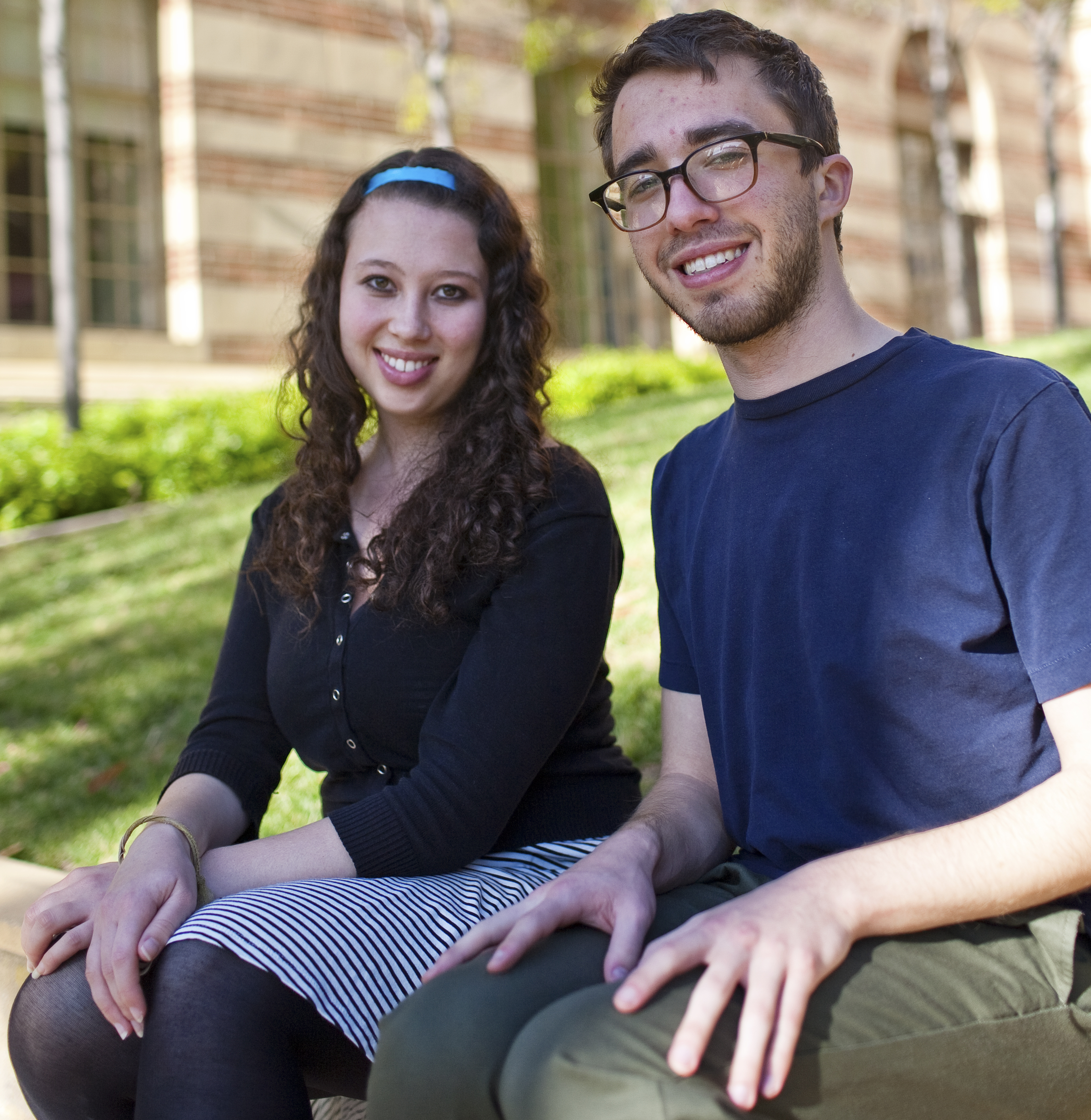Bruins participate in Helix program to enhance knowledge of Jewish identity

Fourth-year history students Ben Steiner and Ali Karol are participants in the Helix program, which focuses on Jewish identity.
By Melissa Truong
April 19, 2012 12:42 a.m.
In Rob Adler Peckerar’s mind, Jewish students today study more about the destruction of Jewish culture than how it thrived and was experienced by Jews before the devastation of the Holocaust.
So he created a program to remedy what he sees as a lack of cultural knowledge in students.
As the executive director of Yiddishkayt Los Angeles, an organization that celebrates Yiddish as a pathway to Jewish identity, Adler Peckerar created Helix, a program named after the spiral shape of DNA, the molecule which contains genetic information and connects past generations with present ones. In the case of his program, the connection to DNA will be in a cultural sense, Adler Peckerar said. The 10-day pilot program will take six students from UCLA and UC Berkeley on an all-expenses paid trip to Eastern Europe.
“My sense is that Jewish students know a lot about the destruction of Jewish culture, but not its achievements,” he said. “They know about the murder of Jews, but not about Jewish life.”
Ali Karol and Ben Steiner, both fourth-year history students, are two out of six students participating in the Helix pilot program this summer.
At the end of his high school career, Steiner said he went on a trip that focused more on the Holocaust and the destruction of Jewish culture. This is typical of Jewish culture programs that take place in Eastern Europe, Adler Peckerar said.
Stein said he is excited to go back to Eastern Europe as part of a site-focused trip and looks forward to seeing Jewish culture pre-Holocaust and the rebuilding that followed it.
“I hope to take away the beauty of these places, this inexorable human capacity to rebuild after destruction,” Steiner said.
Participants of the pilot program were nominated by Jewish studies professors from both UCLA and UC Berkeley and were selected through an interview and application process. Twelve students applied but only half were accepted to the inaugural program.
Although students will only be in Eastern Europe for 10 days for the pilot program, the full program will last three weeks, and will include training in Eastern European languages and Yiddish before the trip. Karol and Steiner will meet the other participants one week before the trip and take part in a series of workshops and seminars on the study of Jewish culture and learn basic Yiddish, Russian, Lithuanian and Polish to enable them to get around the towns they intend to visit.
The main portion, the tour of Eastern Europe, will cover parts of the historical Grand Duchy of Lithuania, which includes towns in Poland, Belarus and Lithuania. For the most part, these cities held a sizable, if not majority Jewish population before World War II.
Graduate students from both UCLA and UC Berkeley who are scholars of Eastern European Jewish life will lead the trips.
Though Helix seeks to educate students in Jewish culture before the Holocaust, David Myers, chair of the history department, who helped recommend students for the trip, said knowledge of the Jewish cultural vitality that preceded the Nazi genocidal campaign is also crucial in understanding the enormity its destruction.
“The two efforts ““ chronicling the destruction and analyzing the rich fabric of Jewish culture ““ go hand in hand,” Myers said.
Miri Koral, a lecturer at UCLA in Yiddish and Jewish studies, agreed that studies about the destruction of Jewish culture have been taught more than studies about the building of it. Koral is involved with Yiddishkayt, but will not be participating in the program this summer, she said.
Sitting in her office in Royce Hall, Koral pointed to the numerous bookcases and cardboard boxes crammed with heavy, bound Yiddish books.
“This is nothing compared to the ocean of the amazing literature and songs that exist,” she said. “In a culture that is so rich and beautiful, the sadness and tragedy for us is that it has been forgotten.” Steiner said the Helix group is a Yiddish “enthusiast sort of group” that sees the culture that existed as significant and something that should be maintained.
“Will it be a triumph of Yiddish revivalism? I don’t think so, but I do think it will be meaningful,” he said. “There is definitely something to be said about going back to these places and seeing what remains alive there, if anything.”
As a UCLA undergraduate, Karol focuses mainly on Holocaust studies. But she said she is interested in learning about pre-World War II Jewish culture this summer.”I kind of see it as a capstone to my Jewish education at UCLA,” Karol said.
Koral said the students going on the trip are part of a generation that is waking up and trying to look at the Jewish culture as a source of pride that is not tied up with death, destruction and victimhood as it was for the previous generation.
She said she hopes students will experience what she felt when she first visited Eastern Europe. “You’re confronted by the reality of the absence, of the “˜presence of absence’ (of Jewish culture) and what really hits home is that something precious was lost,” Koral said.
Both Karol and Steiner said they don’t know what to expect ““ but they’re hoping for a learning experience, they said.


